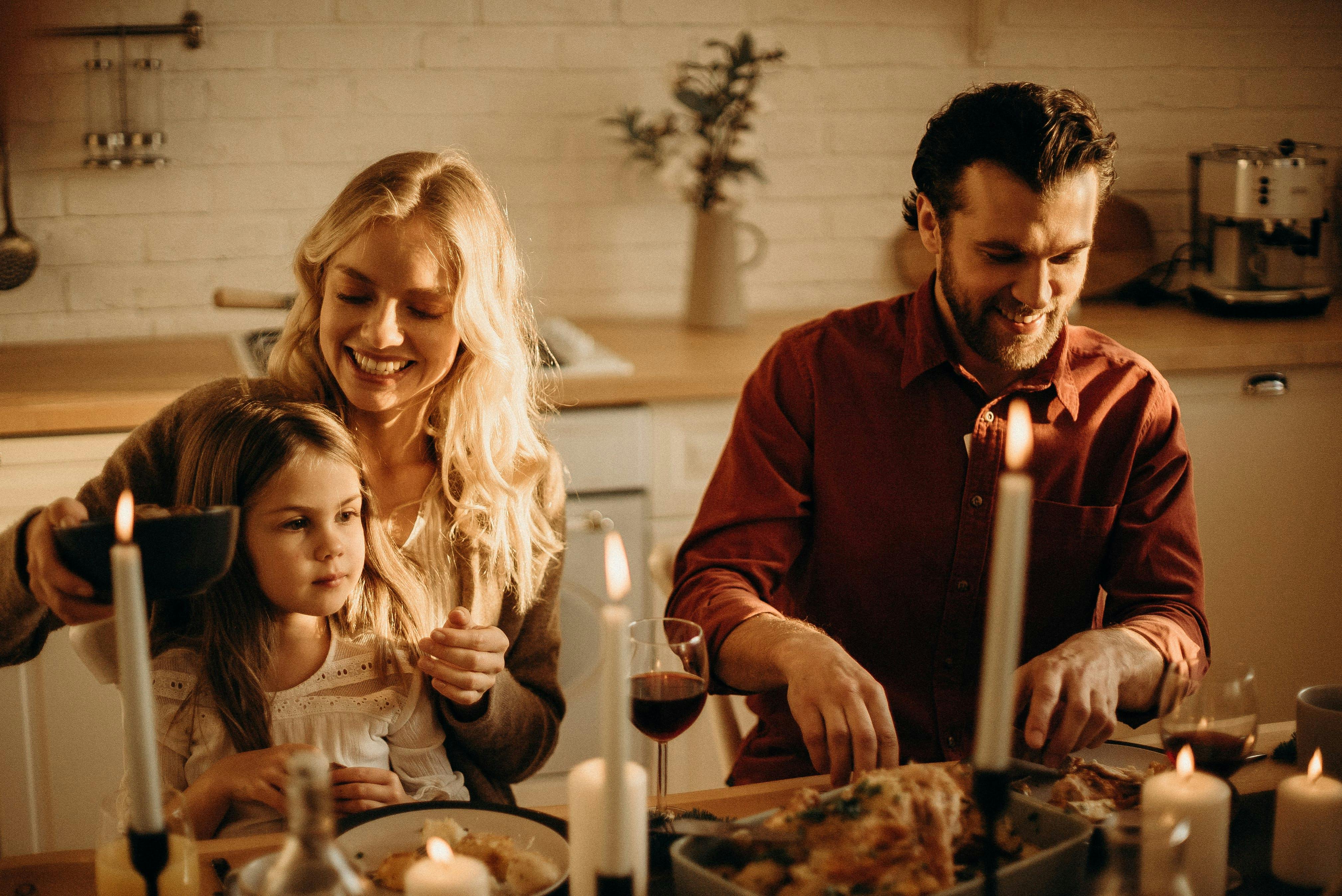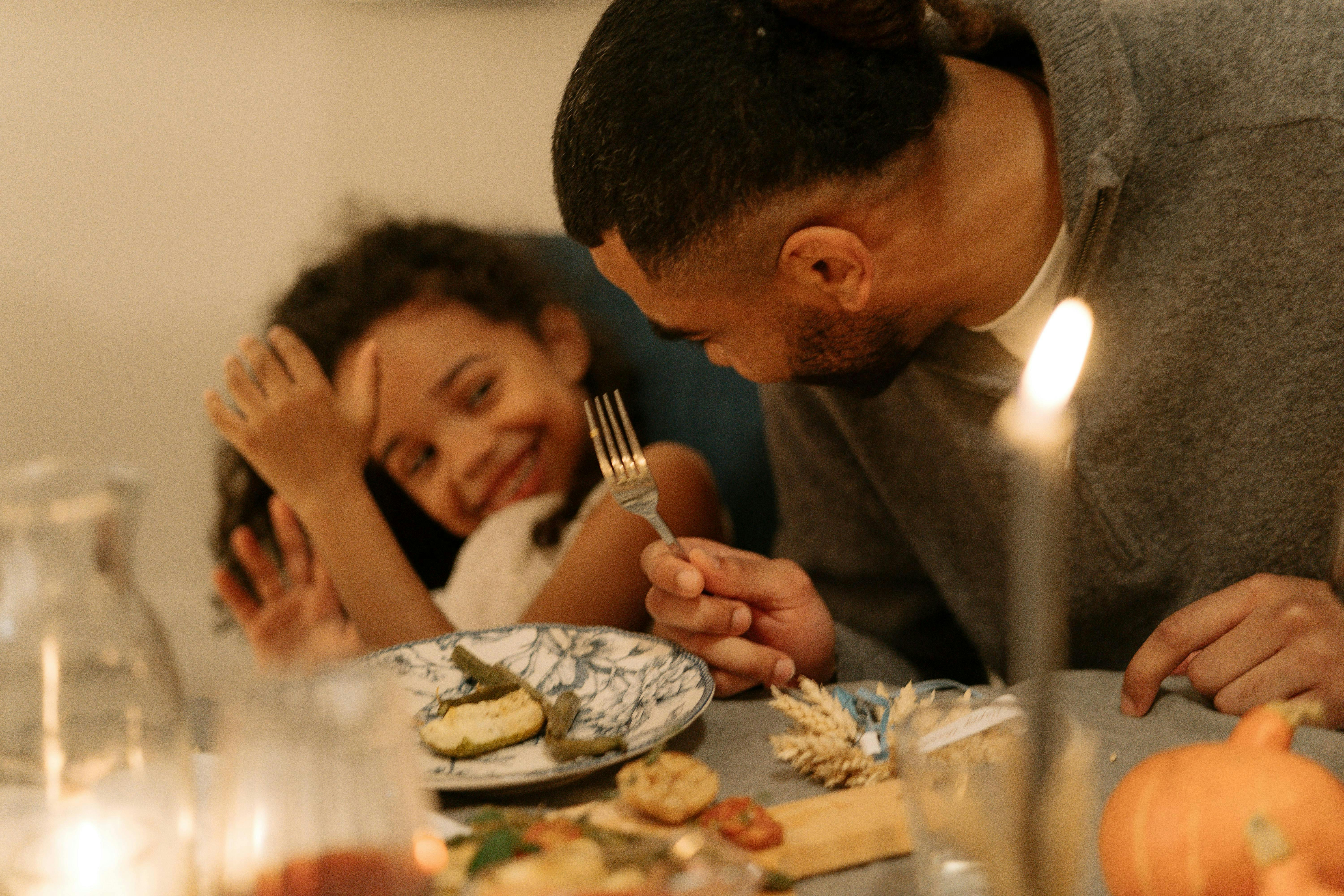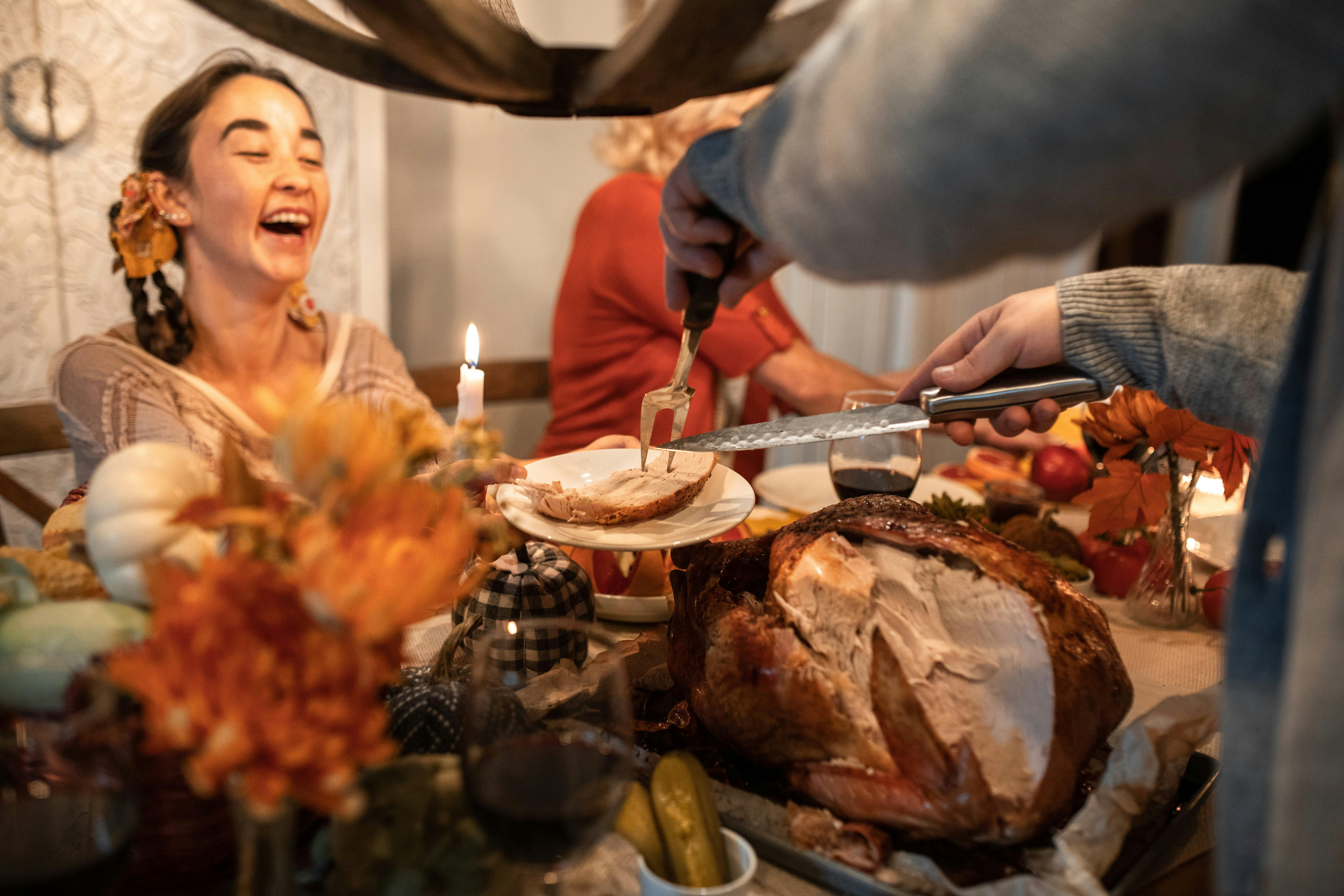Who doesn’t love a nice religious or political discussion mixed in with their green bean casserole?
If Christmas Vacation or The Bear (season two, episode six) have taught us anything, it’s that the holiday dinner table can be a gateway for extreme division, and ugly crying. Take all that and add in a splash of open-ended conversation on polarizing existential topics, and you’re looking at the breeding ground for nuclear war in your dimly-lit dining room (and some trauma to be later worked out in counseling).
As a culture, we have learned to stay clear of red-flag holiday dinner table topics and vowed to keep the discussion centered around school, movies, and work. But all it takes is that one niece to bring up their new spiritual cosmology or that one uncle to start talking about the election to unravel all that was being kept under a lid.
Suddenly—forks are thrown, names are called, and feelings are hurt. Someone is filing for disownment, another is storming out the door, and the cherry pie or evening NFL game can’t come soon enough. So much for those joyous dinner table vibes that Walmart commercials make look so easy.

What are we to do? Are we doomed for every November and December to be laced with eye rolls, personal jabs, and tables being flipped? Should we put our heads down and limit the conversation to just complimenting the food? Or—just skip out on the dinner altogether?
If you, too, are tired of your dining room aura settling for either total awkward silence or the spewing of opinions through a fountain of tears and mouth foam, then we are one step closer to a better way. One that I believe includes meaningful discussion, egos being laid aside, and bonding like you haven’t seen before with your family.
This year is our chance to turn the tide. And before you call me a blind optimist—my Enneagram four personality type and generalized anxiety disorder would say otherwise. Plus, I’ve been at the tables described above, where you’re lucky to walk away without a physical or verbal laceration. If anyone knows this is a tall hill (mountain) to climb, I’d say I’m in the running.
That being said, who wouldn’t want healthy, lively, and full-of-laughter table talk these holidays? I mean, of course, we want to be able to talk about real things with the people we care most about. We just may not know how it’s possible and think it will inevitably end with someone standing on a chair and frothing at the mouth about the political climate.
But this year, we have a new plan.
We don’t have to just “survive” holiday dinner tables. If you’re willing to take a risk with me (what have you got to lose?), let’s try out a new strategy based on the habits of Jesus that could bring joy and life to your holiday dinners—where you don’t have to choose between silence and screaming, and instead can set the table for healthy, in-depth conversations to take place.
LISTEN, Listen, Listen
“This war represents a failure to listen.” - Padmé Amidala
Could the late spouse of Anakin Skywalker have some wisdom for our holiday dinner table talk? For most of the year, we can take to social media to air our grievances, ideas, and opinions regarding a loud world. Here, we can yell to an empty void and block, mute, or click away from any response. But for a few days annually, we get free reign to take those dark-web thoughts to real people and forget that a dialogue takes two to tango.

It is a mind-blowingly under-the-radar trait to be a listener in today’s culture. To listen, and dare I say, ask curious questions, is a relic of a time that…well, I don’t even know if we have ever had a time such as that. Listening is a powerful tool to disarm agitated opinion spewers, slow down a conversation, and let discourse healthily breathe.
Jesus often listened, and not just with the goal to respond. He’d let people go on tangents without interruption, only to “look at them and love them.” For the most wise and all-knowing person who ever lived, Jesus sure was okay with someone else grabbing the mic at times (even if He knew exactly what they would say).
When you’re shoving your face with rolls and start getting an earful of why some new governing policy is an abomination, or how that one verse in the Bible actually means something else, practice nodding and turning your other ear to listen more. Not only will it teach you to empathize, but you may learn something from what you hear (even if it’s one out of 100 times).
“Know this, my beloved brothers: let every person be quick to hear, slow to speak, slow to anger;” (James 1:19)
LEAD Where a Void Exists
“Attitude reflects leadership, captain.” - Julius Campbell
Jesus was fairly young, hated by many, not that good-looking, not a yeller, and had his fair share of public cry sessions. By our world’s standards, not a first-round draft pick to be the head of a table. But through the way he lived, with humility and curiosity, he became the greatest leader known to humanity. At your table this year, you can also be a great one.

How did Jesus do some of his best leading? Through asking lots of questions. We can set the pace of the room to one where asking questions is common, and people have the floor to be candid without being interrupted or having someone roll their eyes.
Jesus also practiced consistent humility to those around him. Lead the way by sharing your shortcomings from the past year and what you learned. Be okay with being wrong if a discussion arises. Normalize saying, “I don’t know enough about that to have an opinion,” if someone asks for your view on a subject. Being secure in our imperfections, lack of knowledge, or failures is an absent trait in society. Give others the freedom not to have it all together and watch as they start to recline in their chairs.
At our dinner tables this year, there may be a preconceived notion of who runs the show. The same parent, brother, cousin, or grandparent (you get it) may dominate conversation from the get-go, making it hard even to squeak out, “Can I go for seconds?”. But Jesus shows us that someone who commits to setting the stage for others can possess influence never thought possible.
Make a point to build others up through encouragement, ask questions, and watch how the temperature of the room changes. People just may be excited to talk with each other about life beyond the best new show that’s streaming or the likely Super Bowl contenders.

Try out these starter questions (aimed at everyone or one person) to get the conversation flowing. Feel free to start light and go more in-depth as you see possible.
- What was good/hard about this year?
- Where did you see God show up in your life this year?
- What is something new you learned this year?
- What is a viewpoint that challenged your thinking this year?
- What is something you are hopeful for next year?
“Do nothing from selfish ambition or conceit, but in humility count others more significant than yourselves.” (Philippians 2:3)
LOOK Up and Around (Sir, this is a Wendy’s)
“I got a lot of problems with you people! And now you’re gonna hear about it!” - Frank Costanza
Some folks (okay, me at times) walk into the holiday feasting area with one mission: to tell (insert person) how wrong they are about (insert topic). That will allow me to finally shut that one person up, show everyone how informed and passionate I am, and have one less evil-thinking person roaming the streets.
Of course, if I hold a particular worldview, it’s probably because I think it’s right and good and helpful for most people. But if I’m being honest, I’ve seen how often I will pursue debates, not for the good of discussion or to be helpful, but to feel right and affirmed in my stance.
Could that be why we (I) get so heated around talks on major worldviews—because we (I) feel threatened not only in that subject matter but also to our (my) core and value as a human?
If we felt confident in our view and who we are in the family of God, would we be a bit more okay with our aunt saying who she voted for, or our brother talking about his astrology viewpoints? Would we be able to hear them out, gently ask questions, and move on, knowing the world is still spinning and God is still real? Would we see that the holiday dinner table is a great opportunity to love and care for our family, not make enemies, or get people kicked out of Grandpa’s will?

Not every opinion needs to be counteracted. Not every perspective needs to be argued. Not every thought needs to be interrogated. Sir, this is a Wendy’s—er, your dining room. If we ever get riled up, let’s remind ourselves who we sit around and how much we love them. Then, smile, sip some iced tea, and think about how awful it’d feel to be personally attacked for every viewpoint we ever share.
If we’re just really in the business of challenging viewpoints for the greater good of man, however, let’s be willing to take a tiny step back and realize that our dining room conversation likely won’t lead to world peace, save the economy, or make every knee bow in Jesus’ name. Creating a loving environment where people are free to share thoughts and admit they are wrong (and not have to worry about a bread roll being beamed at them) is what I believe ultimately changes people’s hearts through God.
“So, whether you eat or drink, or whatever you do, do all to the glory of God.” (1 Corinthians 10:31)
Setting the Table
We all want the Hallmark-looking feast and festivities, but whether it’s something about the confined space, overcooked turkey, or exhaustion from a long year, we can sometimes be a bit on edge when taking our seat at the adult table. So, even if we follow these three suggestions to a T, it doesn’t mean everyone will follow our rules.
And that is okay.

We can only control our seat at the table and do so much in our pursuit of loving others and creating healthy environments. We also will undoubtedly fall short sometimes and take the bait for a duel of words. When that happens, be kind to yourself.
This may be a long game. This may be a rigged game from the start (knowing who sits at your tables every year). So, at the very least, we can enjoy the meal more than usual and feel a peace with God that seemed impossible in years past.
But let’s dream big and pray big this time around. No more strapping on our armor to prepare for a 90-minute scream-off. What if our holiday dinner table became known as a space to unwind from a long year, celebrate the highs, grieve the lows, learn something new, and engage with others’ perspectives?
I believe that seasoned with grace, empathy, and some quirky strategies, we can make it to New Year’s—not just without scars, but with excitement about next year’s feast.
Disclaimer: This article is 100% human-generated.










